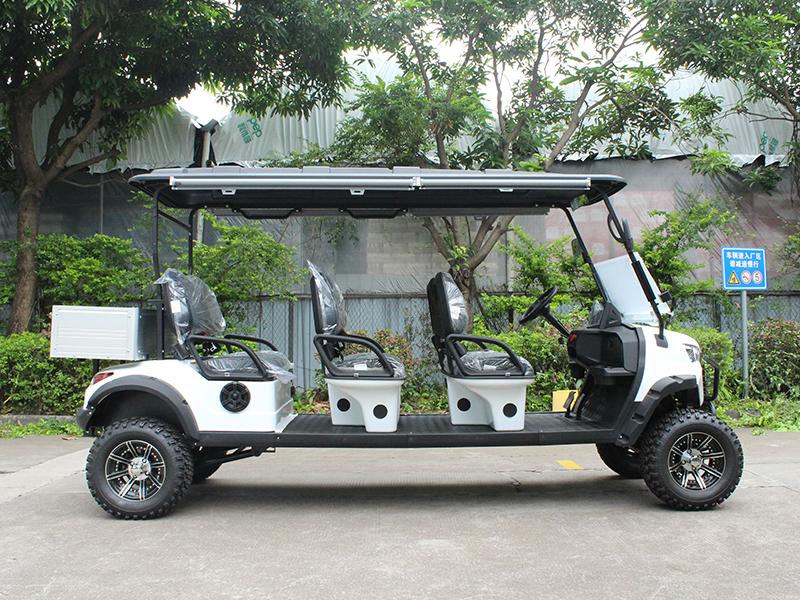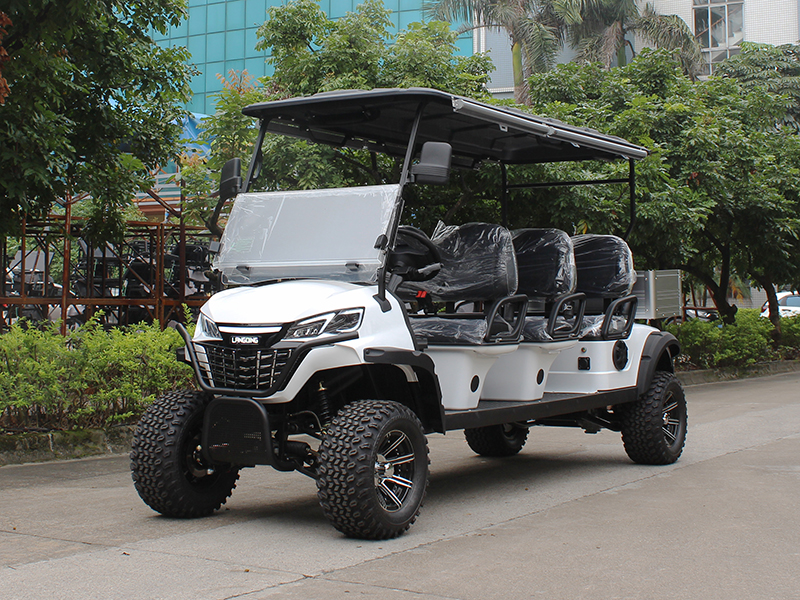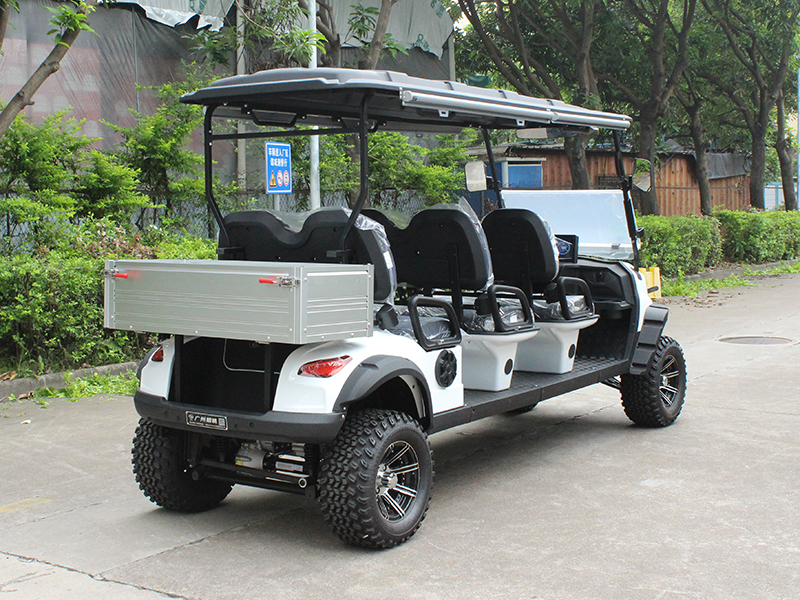Content Menu
● Overview of Japan's Electric Golf Cart Market
● Leading Electric Golf Cart Manufacturers and Suppliers in Japan
>> Yamaha Motor Co., Ltd.
>> Other Notable Japanese Manufacturers and Suppliers
>> International Brands in Japan
● Market Trends and Technological Innovations
>> Demographic Influence: Aging Population and Accessibility
>> Sustainability and Environmental Leadership
>> Technological Advancements Shaping the Market
● Market Challenges and Opportunities
>> Challenges
>> Opportunities
● Why Engage Japanese Electric Golf Cart Manufacturers and Suppliers?
● Conclusion
● Frequently Asked Questions (FAQ)
>> 1. What distinguishes Japanese electric golf carts in the market?
>> 2. Are electric golf carts more rented or individually owned in Japan?
>> 3. How does the aging population affect electric golf cart design?
>> 4. Who are the top manufacturers and suppliers in Japan?
>> 5. What are the future growth trends for Japan's electric golf cart market?
Japan's electric golf cartmarket stands as a beacon of technological innovation, environmental consciousness, and cultural adaptation. With a history steeped in golf culture and rapid adoption of cutting-edge electric vehicle technologies, Japan hosts some of the world's top Electric Golf Carts Manufacturers and Suppliers. This article delves deeply into the key manufacturers, market dynamics, innovation trends, and future outlook of Japan's electric golf cart industry, offering valuable insights to overseas brand owners, wholesalers, and OEM partners interested in this vibrant market.

Overview of Japan's Electric Golf Cart Market
The market for electric golf carts in Japan has been experiencing consistent growth, projected to move from a valuation of approximately USD 55 million in 2025 to nearly USD 80 million by 2035, reflecting a healthy CAGR of about 3.7% to 4.8% over the decade. Several factors propel this expansion:
- A strong cultural affinity for golf with over 2,000 golf courses across Japan.
- An increasingly aging population engaging in golf as a low-impact recreational sport.
- Government policies emphasizing environmental sustainability and zero-emission goals.
- Rapid technological advancements improving performance, safety, and user experience.
Japanese golf courses favor electric golf carts not only for convenience but also for minimizing environmental footprints. Moreover, urban space constraints and lifestyle preferences have encouraged fleet rental models over individual ownership, a characteristic unique to this market.
Golf courses, resorts, retirement facilities, and industrial short-run applications constitute the core usage segments. High-end clubs have embraced emerging technologies such as autonomous driving and GPS tracking, making Japan an early adopter of smart electric golf carts. This integration facilitates seamless mobility for players while enhancing accessibility, especially for older demographics.
Leading Electric Golf Cart Manufacturers and Suppliers in Japan
Yamaha Motor Co., Ltd.
Yamaha Motor is the industry titan in Japan for electric golf carts, renowned globally for its focus on innovation and environmental sustainability. The company's portfolio ranges from electric to gasoline-powered carts, with a growing emphasis on lithium-ion battery technology.
- Their 2025 launched models G30Es and G31EPs utilize proprietary lithium iron phosphate (LFP) battery technology, ensuring longer life cycles and safety.
- Advanced high-precision AC motors, safety features like regenerative braking, and intuitive vehicle control systems characterize their carts.
- Yamaha's focus on reducing power consumption by nearly 30% in recent models underlines their commitment to eco-friendly solutions.
- The company continuously explores hydrogen-power concepts, hinting at future diversification in clean energy golf carts.
Yamaha's reputation for durability and reliability makes it the preferred partner for many overseas brands looking for high-quality OEM manufacturing in the electric golf cart sector.
Other Notable Japanese Manufacturers and Suppliers
- Energy System Service Japan Co., Ltd. caters to a mix of retail and commercial clients, providing electric golf carts along with battery and electric equipment solutions.
- Autocraft Japan Ltd. supports both domestic and international markets with diverse vehicle offerings, including electric carts.
- Asahi Denso Co., Ltd. specializes in vehicle components integral to electric golf cart manufacturing.
International Brands in Japan
The market also hosts major global players such as:
- Textron Inc. (E-Z-GO): Known for street-legal models and stylish designs, focusing on sustainability and comfort.
- Club Car (Ingersoll Rand): Offers luxury and highly customizable electric golf carts tailored for the Japanese market.
These brands push technological and service innovations, spurring competition and quality improvements among Japanese manufacturers.

Market Trends and Technological Innovations
Demographic Influence: Aging Population and Accessibility
Japan's rapidly aging population has created a niche market for golf carts built with accessibility in mind:
- Enhanced ergonomic seating, low step-in heights, and safety mechanisms assist older players.
- Autonomous and semi-autonomous electric carts with electromagnetically guided routes are gaining popularity, reducing physical strain.
- Facilities increasingly offer inclusive golf experiences by integrating these mobility solutions.
Sustainability and Environmental Leadership
Japan's golf cart industry aligns strongly with national sustainability policies aimed at reducing carbon emissions:
- Use of safer, longer-lasting lithium iron phosphate batteries supports eco-friendly operations.
- Solar charging stations are being introduced in premium golf resorts.
- Regenerative braking technologies recoup energy, improving overall efficiency.
- Quiet electric motors reduce noise pollution, enhancing the golfing environment.
Technological Advancements Shaping the Market
Innovation is a hallmark of the Japanese electric golf cart industry:
- Vehicle Control Units (VCUs) and Motor Control Units (MCUs) optimize performance and extend battery life.
- GPS integration and communication systems improve fleet management and player tracking.
- Development of multi-passenger electric carts caters to both private groups and commercial resort demands.
- Emerging trends include integration with smartphone apps for booking, navigation, and personalized vehicle settings.
Market Challenges and Opportunities
Challenges
- Urban Space Constraints: Limited parking and charging infrastructure encourage shared rental fleets rather than private ownership.
- Regulatory Barriers: Strict safety and vehicle classification laws require continuous design adaptations.
- Cost Factors: High upfront investment in battery technology and automation may deter some buyers.
Opportunities
- Rising golf participation among seniors guarantees an expanding target market.
- Autonomous and smart carts create avenues for new product development.
- Exporting advanced Japanese-made golf carts to neighboring Asian markets presents growth potential.
- Collaborations with international tech firms can fast-track innovation and customization capabilities.
Why Engage Japanese Electric Golf Cart Manufacturers and Suppliers?
- They offer superior technological sophistication, especially in battery chemistry and energy-efficient motors.
- Products are world-renowned for reliability and craftsmanship.
- Manufacturers provide customizable solutions addressing varied terrains, passenger capacities, and user preferences.
- Strong emphasis on environmental sustainability resonates with current global and local regulatory frameworks.
These attributes make Japanese manufacturers preferred partners for OEM orders, wholesale procurement, and collaborative product development.
Conclusion
Japan's electric golf cart market exemplifies harmonious integration of history, innovation, and sustainability. Dominated by leaders like Yamaha Motor, the market thrives on adapting to demographic changes, embracing cutting-edge technology, and prioritizing green mobility solutions. The unique rental-centric consumption model and rapid product innovations shape a dynamic industry poised for continued growth. For overseas brand owners and wholesalers seeking reliable and innovative OEM suppliers, Japanese electric golf cart manufacturers and suppliers represent a prudent and strategic choice. With market demand rising and technological frontiers expanding, Japan will remain a cornerstone of the global electric golf cart landscape.

Frequently Asked Questions (FAQ)
1. What distinguishes Japanese electric golf carts in the market?
Japanese electric golf carts stand out for their advanced battery technologies (notably lithium iron phosphate), precise AC motors, and comprehensive eco-friendly features such as regenerative braking and low power consumption. The emphasis on safety, durability, and innovative vehicle control systems sets them apart.
2. Are electric golf carts more rented or individually owned in Japan?
Japan predominantly follows a rental and fleet management model due to urban space limitations and cultural practices. Golf clubs maintain fleets available for rent, reducing individual ownership and maintenance burdens.
3. How does the aging population affect electric golf cart design?
Manufacturers focus on enhanced accessibility features such as easy entry, ergonomic seating, safety upgrades, and autonomous or semi-autonomous operation modes to accommodate the growing senior golfer demographic.
4. Who are the top manufacturers and suppliers in Japan?
Yamaha Motor Co., Ltd. leads the market, greatly followed by companies like Energy System Service Japan and Autocraft Japan. International brands such as Textron Inc. (E-Z-GO) and Club Car also have significant market shares.
5. What are the future growth trends for Japan's electric golf cart market?
Growth will be driven by integration of autonomous driving technologies, environmentally sustainable power solutions, multi-passenger carts, and enhanced digital features like GPS and smartphone connectivity. The rental model and expanding golf participation among seniors will also sustain demand.










































